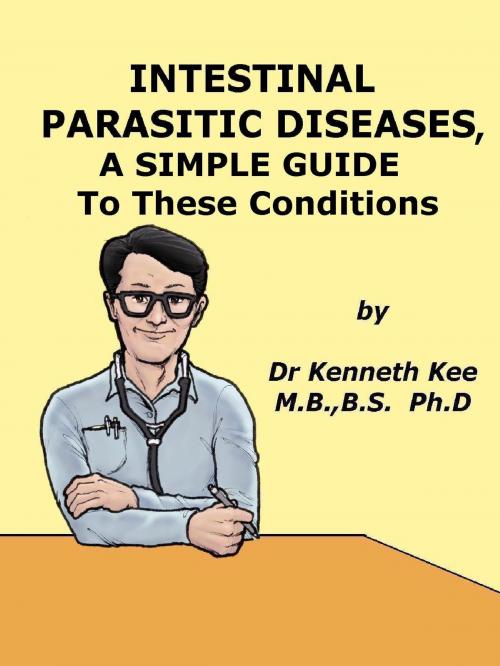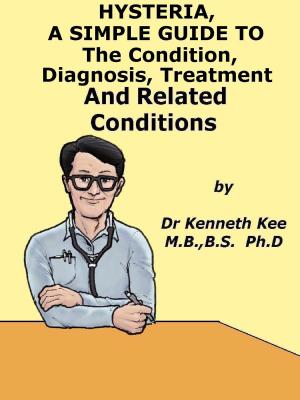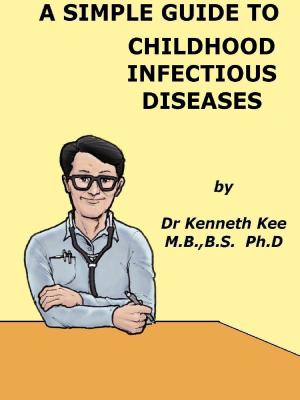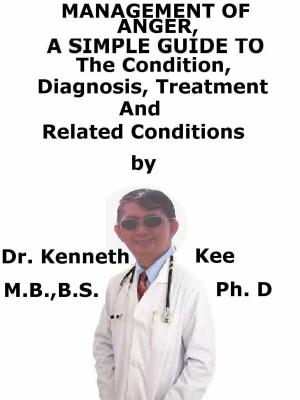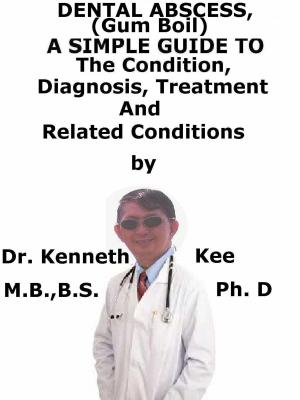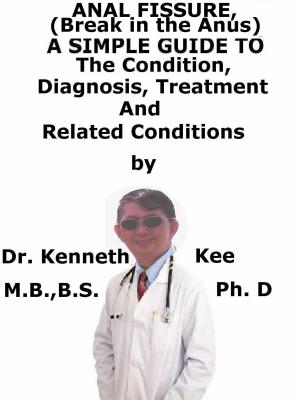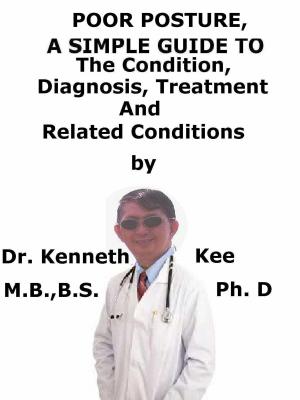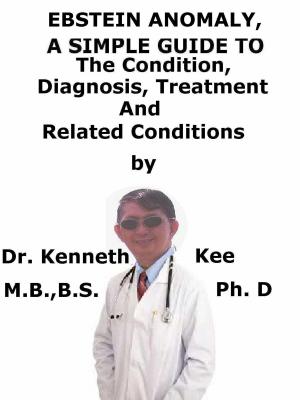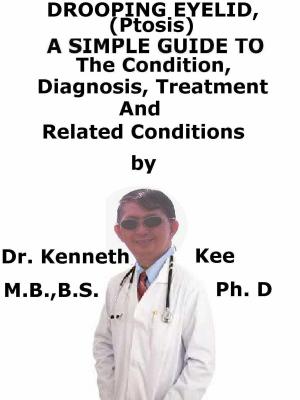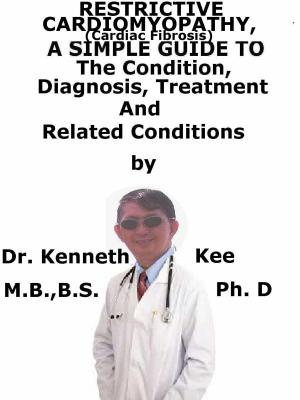Intestinal Parasitic Diseases, A Simple Guide to These Conditions
Nonfiction, Health & Well Being, Medical, Ailments & Diseases, Infectious Diseases, Parasitology, Health, Abdominal| Author: | Kenneth Kee | ISBN: | 9781311828040 |
| Publisher: | Kenneth Kee | Publication: | February 21, 2015 |
| Imprint: | Smashwords Edition | Language: | English |
| Author: | Kenneth Kee |
| ISBN: | 9781311828040 |
| Publisher: | Kenneth Kee |
| Publication: | February 21, 2015 |
| Imprint: | Smashwords Edition |
| Language: | English |
Intestinal Parasitic Diseases
What are Intestinal Parasitic Diseases?
Intestinal Parasitic diseases are illnesses in developing countries which are caused by drinking or coming in contact with food or water contaminated by human or animal feces which have these parasites.
The most common of these parasites are:
- Protozoa
a. Amebiasis
b. Giardiasis
- Roundworms and threadworms
Roundworms:
a. Ascaris
b. Strongyloides
c. Trichinosis
d. Hookworms
(Ancylostoma duodenale and Necator americanus)
Threadworms (pinworms)
-
Human Tapeworms
-
Schistosomiasis or flukes
Most parasites remain in the intestines while others travel outside the intestines to invade other organs.
Most tapeworms and roundworms develop in the human body and lay their eggs there.
The eggs then pass out of the body through feces and can infest others.
Children are most frequently infected with these parasites.
Intestinal parasites occur in areas with poor sanitation and are most common in tropical developing countries on the African, Asian, and South American continents.
How Are Intestinal Parasites Spread?
Intestinal parasites can live in the soil for extended periods.
They may penetrate the body through the skin or if contaminated soil is ingested accidentally.
Some parasites live in animals such as pigs and cows.
People can be infested with these parasites by eating undercooked and raw meat.
The eggs of some intestinal parasites pass through an infested person's gastrointestinal tract and into feces.
The parasite then can spread to other people through contact with the feces.
A person may become infested by touching his or her mouth after contact with feces with the parasites.
Parasites can spread when a person:
-
Eats contaminated food such as unwashed raw fruits or vegetables, which can carry parasites from the soil or from people who have handled them
-
Drinks water contaminated by feces.
Swimming in contaminated water also may result in infestation by certain parasites.
Parasitic intestinal infestations often occur in outbreaks, when several people have symptoms at the same time.
This is especially likely if many people come into contact with the same supply of contaminated food or water.
How Are Intestinal Parasitic Diseases Diagnosed?
-
The feces of suspected patients are examined for evidence of parasites, such as eggs, larvae, or adults.
-
Blood samples can be taken to check for antibodies to specific parasites
-
To detect pinworms, doctors often request that patients take a "tape test at the anus."
How Are Intestinal Parasitic Diseases Treated?
Mild cases require little or no treatment and the parasites eventually disappear on their own.
Medication used to treat the illnesses varies with the type of infection.
Doctors may use antibiotics or antiparasitic medicines.
Children must stay out of daycare until they have been treated adequately and can no longer spread the infection.
Can Intestinal Parasitic Diseases Cause Medical Complications?
- Dehydration is the most common general complication of intestinal parasite infections.
Infants and young children are particularly vulnerable to dehydration and nutrition problems when they become infected.
-
In people with weak immune systems (such as people undergoing chemotherapy), infants, and the elderly, these infections can be fatal.
-
Intestinal obstruction due to the parasites or intussusceptions
-
Spread to the brain, liver or heart may be dangerous and life threatening
TABLE OF CONTENT
Introduction
Chapter 1 Intestinal Parasitic Diseases
Chapter 2 Amoebiasis
Chapter 3 Giardiasis
Chapter 4 Schistosomiasis
Chapter 5 Threadworms
Chapter 6 Round worms
Chapter 7 Tape worms
Intestinal Parasitic Diseases
What are Intestinal Parasitic Diseases?
Intestinal Parasitic diseases are illnesses in developing countries which are caused by drinking or coming in contact with food or water contaminated by human or animal feces which have these parasites.
The most common of these parasites are:
- Protozoa
a. Amebiasis
b. Giardiasis
- Roundworms and threadworms
Roundworms:
a. Ascaris
b. Strongyloides
c. Trichinosis
d. Hookworms
(Ancylostoma duodenale and Necator americanus)
Threadworms (pinworms)
-
Human Tapeworms
-
Schistosomiasis or flukes
Most parasites remain in the intestines while others travel outside the intestines to invade other organs.
Most tapeworms and roundworms develop in the human body and lay their eggs there.
The eggs then pass out of the body through feces and can infest others.
Children are most frequently infected with these parasites.
Intestinal parasites occur in areas with poor sanitation and are most common in tropical developing countries on the African, Asian, and South American continents.
How Are Intestinal Parasites Spread?
Intestinal parasites can live in the soil for extended periods.
They may penetrate the body through the skin or if contaminated soil is ingested accidentally.
Some parasites live in animals such as pigs and cows.
People can be infested with these parasites by eating undercooked and raw meat.
The eggs of some intestinal parasites pass through an infested person's gastrointestinal tract and into feces.
The parasite then can spread to other people through contact with the feces.
A person may become infested by touching his or her mouth after contact with feces with the parasites.
Parasites can spread when a person:
-
Eats contaminated food such as unwashed raw fruits or vegetables, which can carry parasites from the soil or from people who have handled them
-
Drinks water contaminated by feces.
Swimming in contaminated water also may result in infestation by certain parasites.
Parasitic intestinal infestations often occur in outbreaks, when several people have symptoms at the same time.
This is especially likely if many people come into contact with the same supply of contaminated food or water.
How Are Intestinal Parasitic Diseases Diagnosed?
-
The feces of suspected patients are examined for evidence of parasites, such as eggs, larvae, or adults.
-
Blood samples can be taken to check for antibodies to specific parasites
-
To detect pinworms, doctors often request that patients take a "tape test at the anus."
How Are Intestinal Parasitic Diseases Treated?
Mild cases require little or no treatment and the parasites eventually disappear on their own.
Medication used to treat the illnesses varies with the type of infection.
Doctors may use antibiotics or antiparasitic medicines.
Children must stay out of daycare until they have been treated adequately and can no longer spread the infection.
Can Intestinal Parasitic Diseases Cause Medical Complications?
- Dehydration is the most common general complication of intestinal parasite infections.
Infants and young children are particularly vulnerable to dehydration and nutrition problems when they become infected.
-
In people with weak immune systems (such as people undergoing chemotherapy), infants, and the elderly, these infections can be fatal.
-
Intestinal obstruction due to the parasites or intussusceptions
-
Spread to the brain, liver or heart may be dangerous and life threatening
TABLE OF CONTENT
Introduction
Chapter 1 Intestinal Parasitic Diseases
Chapter 2 Amoebiasis
Chapter 3 Giardiasis
Chapter 4 Schistosomiasis
Chapter 5 Threadworms
Chapter 6 Round worms
Chapter 7 Tape worms
